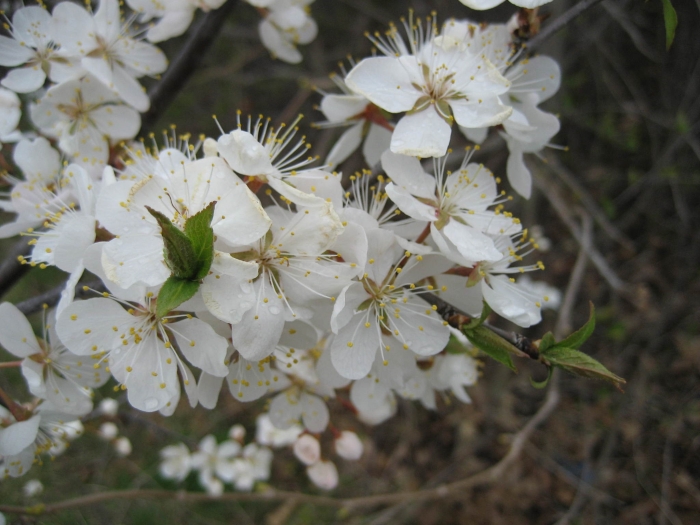Canadian Plum
(Prunus nigra)
Canadian Plum (Prunus nigra)
/
/

rboles
CC BY 4.0
Image By:
rboles
Recorded By:
Copyright:
CC BY 4.0
Copyright Notice:
Photo by: rboles | License Type: CC BY 4.0 | License URL: http://creativecommons.org/licenses/by/4.0/ | Rights Holder: rboles | Publisher: iNaturalist | Date Created: 2021-04-25T12:56:53-07:00 |




















































Estimated Native Range
Summary
Prunus nigra, commonly known as Canadian Plum, is a deciduous shrub or small tree native to open woodlands and forest edges in the North-Central and Northeastern USA, as well as parts of Canada. It typically grows to 10 meters (33 feet) tall with a trunk up to 25 centimeters (10 inches) in diameter. The plant has a low-branched, dense crown of stiff, rigid branches. Its bark is gray-brown, with older layers peeling off in thick plates. The winter buds are chestnut brown, long-pointed at the tip, and up to 8 millimeters (3⁄8 inch) long. The flowers, which are 15–25 mm (5⁄8–1 inch) in diameter, have five rounded petals that are white fading to pale pink, with a slightly irregular notched margin. They are slightly fragrant and borne in three to four-flowered umbels with short, thick peduncles, blooming before the leaves in mid to late spring. The fruit is an oblong-oval drupe, 25–30 mm (1–1+1⁄8 inch) long with a tough, thick, orange-red skin and yellow flesh adhering to the stone, maturing in late summer or early autumn.
Canadian Plum is valued for its early spring flowers and edible fruit, which can be used in jellies and preserves. It is often used in naturalized plantings, wildlife gardens, and as a pollinator attractor. This species is adaptable but grows best in alluvial soils and prefers full sun to part shade with high water availability and medium to slow-draining soils. It is relatively low-maintenance but can be susceptible to diseases such as black knot and pests like borers.CC BY-SA 4.0
Canadian Plum is valued for its early spring flowers and edible fruit, which can be used in jellies and preserves. It is often used in naturalized plantings, wildlife gardens, and as a pollinator attractor. This species is adaptable but grows best in alluvial soils and prefers full sun to part shade with high water availability and medium to slow-draining soils. It is relatively low-maintenance but can be susceptible to diseases such as black knot and pests like borers.CC BY-SA 4.0
Plant Description
- Plant Type: Tree
- Height: 4.5-16 feet
- Width: 4.5-9 feet
- Growth Rate: Moderate
- Flower Color: White
- Flowering Season: Spring
- Leaf Retention: Deciduous
Growth Requirements
- Sun: Full Sun, Part Shade
- Water: Medium
- Drainage: Medium
Common Uses
Bee Garden, Bird Garden, Butterfly Garden, Edible*Disclaimer: Easyscape's listed plant edibility is for informational use. Always verify the safety and proper identification of any plant before consumption., Fragrant, Low Maintenance, Rabbit Resistant, Showy Flowers
Natural Habitat
Open woodlands and forest edges
Other Names
Common Names: Canada Plum , Black Plum
Scientific Names: Prunus nigra , Prunus nigra f. roseiflora , Prunus americana var. nigra , Prunus nigra f. nigra
GBIF Accepted Name: Prunus nigra Aiton